September 7, 2018
Edited by David Sanders
Specimen Days
1756 —Willem Bilderdijk, Dutch poet/literature (Disease of Scientists), is born.
1867—Camilo d'Almeida Pessanha, Portuguese poet (China), is born.
1876—C.J. Dennis, Australian poet and writer (d. 1938), is born.
1892—John G Whittier, US poet/secretary Anti-Slavery Society, dies.
1907—R F Armand Sully-Prudhomme, French poet (Poesies, Nobel 1901), dies.
1920— Harri Webb, Welsh poet and nationalist, born in Swansea, Wales (d. 1994), is born.
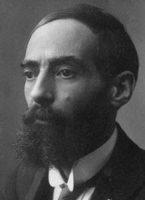
Ingenuous dreamer — your golden beliefs
Do not destroy them, let destiny
Carry you in your baby cradle,
For you may lose this treasure.
Belief is a beacon. You do not seek it,
But how well you see it, shining toward the infinite! …
And the man of thought, — a reprobate,
Searching out light in vain — is always in darkness.
—from “Sonnet of Ice” by Camilo Pessanha, tr. by Ian Watts
“Belief is a beacon. You do not seek it, / But how well you see it” – Camilo Pessanha
World Poetry
Kikuyu Poem Being Sold for Ksh1 Million
A vernacular poem written in Kikuyu is set to be sold for a minimum price of Ksh1 Million. The unique piece titled: Mathabu ma Carey Francis (The Mathematics of Carey Francis) was penned by Kenyan writer Alexander Nderitu and is set for auction. The poem is in the form of a message from a young man in gicagi (the boondocks) to his better-educated girlfriend in Nairobi City.
'Bride of Matanzas,' Cuban Erotic Poet Carilda Oliver Dies at 96
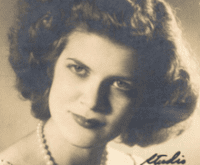
The groundbreaking, award-winning Cuban poet Carilda Oliver passed away Wednesday in her Matanzas home at the age of 96, an official press release has said. With more than 40 published works, Oliver rocked Cuban society with her eloquently prosed erotic writings with titles such as "South of my throat," "Fidel’s Song,” “Song to Matanzas," "A Woman Writes," and finally "Lyrical Biography of Sister Juana Ines de la Cruz."
The groundbreaking Cuban poet Carilda Oliver passed away Wednesday in her Matanzas home at the age of 96.
Recent Reviews
Herbert Unbound
by Anna Arno
In the poem About Mr Cogito’s Two Legs, Zbigniew Herbert described his protagonist’s left leg as ‘normal/one could say optimistic/a little too short’, while the right leg was ‘thin/with two scars/one along the Achilles tendon/the other oval/pale pink/shameful reminder of an escape’. Herbert’s own right lower limb was shorter, as a result of an unfortunate skiing accident at the age of seventeen. Later, the poet claimed to have suffered injury two years later, during military service in the Second World War. However, there are no documents to prove Herbert’s military exploits: Dates and places do not compute. Andrzej Franaszek’s monumental two-volume biography marks the twentieth anniversary of Zbigniew Herbert’s death.
The House With Only an Attic and a Basement by Kathryn Maris – review
Maris’s detailed, hyper-fast poems wittily bridge the gap between the genders
by Kate Kellaway
This is the house that Kathryn Maris built: it has “only an attic and a basement”. What does it signify to have a bodiless house? The title is typical of this crisp, funny, lightly disturbing collection. Maris is a mistress of fragile structures. A wit informs her sometimes painful, mannered poems – their affectation a coping strategy. What Women Want is formed by layered futility: the woman’s superstitious initiative rendered null by the husband’s incurious loftiness. It plays with the pointlessness of its subject until the poem becomes the point. The charm of the book is that it is the poems themselves that offer stability. It is they that bridge – where a bridge is possible – the gap between the sexes (“The man in the basement wrote stories about heroin/ the woman in the attic read stories with heroines”). This is the gap that keeps threatening to become a void.
Poetry’s Hanging Judge Tries On a Detective Hat
by Robert P. Baird
By the tranquil standards of poetry criticism, William Logan is a slasher, a burner, a brawler, a big-game hunter with a sleepless eye. For most critics, writing a negative review is roughly as appealing as euthanizing a beloved corgi. When the deed must be done — a foundering book put out of its misery — the unfortunate task is executed with maximum stirrings of pity and regret. Wine is poured, candles are lit, better days are remembered fondly and at length. Only then is the fatal dose slipped solemnly under the tongue.
Forrest Gander’s Grief Sounds
In his new collection, “Be With,” the poet yearns, endures, and tries to spin the inchoate into words.
by Dan Chiasson
The title of Forrest Gander’s latest book of poems, “Be With” (New Directions), is a blurted command welling up from yearnings not quite expressible in language. Gander’s partner of more than thirty years, the poet C. D. Wright, died unexpectedly in her sleep in 2016. Later that year, a new volume by Wright, “ShallCross,” was published posthumously, with a dedication to Gander: “for Forrest / line, lank and long, / be with.” Gander borrows his title from that dedication, which reads like a message from beyond the grave. This collection of elegies for Wright confirms receipt of the message and returns it. Poetry often creates a supernatural-seeming rapport with the dead, but rarely has the communication between worlds felt so eerily reciprocal.
By the tranquil standards of poetry criticism, William Logan is a slasher, a burner, a big-game hunter with a sleepless eye.
Broadsides
The State of Poetry: Loud and Live
by Dana Gioia
American poetry is thriving. American poetry is in decline. The poetry audience has never been bigger. The audience has dropped to historic lows. The mass media ignores poetry. The media has rediscovered it. There have never been so many opportunities for poets. American poets find fewer options each year. The university provides a vibrant environment for poets. Academic culture has become stagnant and remote. Literary bohemias have been destroyed by gentrification and rising real estate prices. New bohemias have emerged across the nation. All of these contradictory statements are true, and all of them are false, depending on your point of view. The state of American poetry is a tale of two cities.
The Refrains of Kashmir: Agha Shahid Ali's Canzones and the Forms of Exile
by Caleb Agnew
Freedom’s terrible thirst, flooding Kashmir,
is bringing love to its tormented glass.
Stranger, who will inherit the last night
of the past? Of what shall I not sing, and sing?
These concluding lines to Agha Shahid Ali’s canzone “After the August Wedding in Lahore, Pakistan” disclose the crucial intersections of his exilic poetics—the hope of freedom within the “tormented glass” of form, the question of aesthetic versus political inheritances, and finally the choice of poetic object. Ali’s poetry aims to represent his experience as a “Kashmiri-American” poet by reflecting on his life and locales, past and present, but frequently his work turns his own experience into a heuristic for thinking through the notion of exile as the lyric situation, as in his conclusion to the “Ghazal” that ends each couplet with “by exiles”: “Will you, Belovéd Stranger, ever witness Shahid— / two destinies at last reconciled by exiles?” (Ali 298). He ends the ghazal with a terrifying lyric question, carving speaker and reader into the shape of their estrangements, as those two destinies (to write and to read as the teloi of literary connection) emerge in the alienations of writer from lyric subject and reader from interpellated other (both beloved and strange).
All Architectures I Am: The (Unintended) Legacy of Charles Olson’s Projective Verse
by Max Lesser
Do you care about 20th-century American poetry? If so, you may be embarrassed to admit it. In our culture, too many regard poetry, and especially the poetry of the last century, as having all the real-world utility of underwater basket-weaving. That reputation, though unfortunate, may be well deserved.
Do you care about 20th-century American poetry? If so, you may be embarrassed to admit it.
Drafts & Fragments
Jennifer Lawrence and Frank O’Hara: From Hunger Games to Lunch Poems
by Andrew Epstein
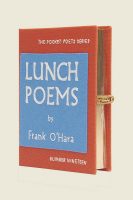
I’m always on the lookout for surprising Frank O’Hara sightings, but I definitely didn’t see this one coming. The Daily Mail is reporting today that when the movie star Jennifer Lawrence was spotted in New York on Sunday on a date with her boyfriend, art dealer Cooke Maroney, the “action star was carrying a copy of Frank O’Hara’s 2001 poetry book, Lunch Poems.” (The book was actually published in 1964, not 2001, but who’s counting?).
Poetry In the News
A Packed Bethel Crowd Reads Poetry With US Poet Laureate
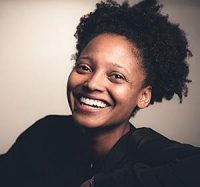
Bethel residents crowded into the town’s Cultural Center on Tuesday night to attend an intimate reading with U.S. Poet Laureate Tracy K. Smith. Smith has spent the past year traveling to remote communities and engaging residents in conversations about the role that art plays in their lives. "I’m hoping to find a practical vocabulary for compassion," she explained to her audience, "which I think is a beautiful goal; something we’ve had many opportunities as a nation to embrace, but we haven’t taken them up." Bethel was her first stop in Alaska.
New Books
bury it by sam sax
[Paperback] Wesleyan, 88 pp., $14.95
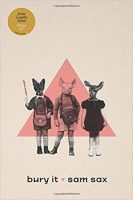
sam sax’s bury it, winner of the 2017 James Laughlin Award from the Academy of American Poets, begins with poems written in response to the spate of highly publicized young gay suicides in the summer of 2010. What follows are raw and expertly crafted meditations on death, rituals of passage, translation, desire, diaspora, and personhood. What’s at stake is survival itself and the archiving of a lived and lyric history. Laughlin Award judge Tyehimba Jess says “bury it is lit with imagery and purpose that surprises and jolts at every turn. Exuberant, wild, tightly knotted mesmerisms of discovery inhabit each poem in this seethe of hunger and sacred toll of toil. A vitalizing and necessary book of poems that dig hard and lift luminously.” In this phenomenal second collection of poems, sam sax invites the reader to join him in his interrogation of the bridges we cross, the bridges we burn, and bridges we must leap from.
Comfort Measures Only: New and Selected Poems, 1994–2016 by Rafael Campo
[Paperback] Duke University Press Books, 184 pp., $22.95
In Comfort Measures Only, Rafael Campo bears witness to the unspeakable beauty bound up with human suffering. Gathered from his over twenty-year career as a poet-physician, these eighty-nine poems—thirty-one of which have never been previously published in a collection—pull back the curtain in the ER, laying bare our pain and joining us all in spellbinding moments of pathos. The poet, who is also truly a healer, revives language itself—its sounds channeled through our hearts and lungs, its rhythms amplified through the stethoscope—to make meaning of our bewilderment when our bodies so eloquently and yet wordlessly fail us. Campo’s transcendent poems, in all their modernity amidst the bleep of heart monitors and the wail of ambulance sirens, remind us of what the ancients understood: that poetry sustains us, and whether we live or die, through what we can imagine and create in our shared voices we may yet achieve immortality.
American Radiance by Luisa Muradyan
[Paperback] University of Nebraska Press, 84 pp., $17.95
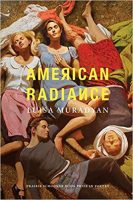
What does it mean to be an American? Luisa Muradyan doesn’t try to provide an answer. Instead, the poems in American Radiance look for a home in history, folklore, misery, laughter, language, and Prince’s outstretched hand. Colliding with the grand figures of late ’80s and early ’90s pop culture, Muradyan’s imagination pushes the reader forward, confronting the painful loss of identity that assimilation brings.
Autobiography of a Wound by Brynne Rebele-Henry
[Paperback] University of Pittsburgh Press, 96 pp., $17.00
In ancient fertility carvings, artists would drill holes into the woman’s body to signify penetrability, which is the basis of Autobiography of a Wound: allowing those wounds and puncture marks to speak through the fertility figures. The wounds are chronicled through letters and poems addressed to F (F stands for the fertility carvings themselves, which are being addressed as one unified deity), and A (Aphrodite, who is being referenced as a general deity of womanhood, a figurine that reappears throughout the poems, and a symbol that is referenced or portrayed in almost every fertility figurine or carving). Autobiography of a Woundreconstructs the narrative surrounding female pathos and the idea of the hysteric girl.
Blue Mistaken for Sky by Andrea Hollander
[Paperback] Autumn House, 96 pp., $17.95
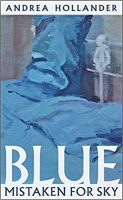
Award-winning author Andrea Hollander’s fifth full-length poetry collection explores a mature woman’s life after divorce. The poems are unselfconscious, and they detail with grace the pleasures and difficulties of aging, and the evolution of personal relationships through a life.
What does it mean to be an American? Luisa Muradyan doesn’t try to provide an answer.
Correspondences
An Essential Form of Human Research
Natalie Diaz interviews Lisa Olstein, author of the collection Late Empire
In her first three books of poems, Lisa Olstein demonstrated a uniquely heightened attentiveness, an environmental sensitivity that took note of such resonant minutia as “the quiet ribs / of a salamander crossing the old pony post road” as it stood watch against such large-scale threats as surveillance drones “filling the sky with robotic eyes” like “automaton dragonflies.” The poems in Late Empire, Olstein’s recent fourth collection, are among her most vigilantly keen-eyed and close-focused yet. “Seated in the horse’s ear,” the book tells us, there is “a wild little knoll, an entire world.” Earlier this year, Natalie Diaz, author of When My Brother Was an Aztec and Olstein’s colleague at the University of Texas at Austin last fall, asked Olstein about this latest book, its composition, its contexts, its indebtedness to Bachelard’s The Poetics of Space, and its unwavering engagement with world we live in now. This is their conversation
What Is a Poet?
Deeply suspicious of anything that smacks of self-importance, of making a blanket statement or pronouncement, Clark Coolidge resists nailing down what the poet and poem are.
by John Yau

In 1967, Clark Coolidge moved from Cambridge, Mass., where he was living with Aram Saroyan and others, to San Francisco to join David Meltzer’s band, Serpent Power. In 1970, Clark and his wife, Susan — whom he met in San Francisco — moved to the Berkshires in western Massachusetts, where they lived on a hill at the end of a dirt road for 27 years. In 1997, they moved to Petaluma, California. Back in California, Clark saw more of David. Poet is Coolidge’s response to a poem, “When I Was a Poet” by Meltzer, which he heard his friend read many times. I think of the two works — Meltzer’s “When I Was a Poet” and Coolidge’s Poet — as a call-and-response between two old friends and musicians who played together on many occasions, talked into the wee hours of the night, enjoyed each other’s company, and read and respected each other’s work. As William Blake wrote: “I cannot think that real poets have any competition.”
In 1967, Clark Coolidge moved from Cambridge, Mass to San Francisco to join David Meltzer’s band, Serpent Power.
Envoi: Editor’s Notes
Do you care about 20th-century American poetry? If so, you may be embarrassed to admit it.
This is the puzzling start of the essay on Charles Olson posted above.
Yeats, Heaney, Milosz, Frost, Stevens, Bishop, Wilbur, Hecht, Lowell, Larkin, Eliot, Auden, Moore, Plath, Merwin, Neruda, Lorca, Soyinka, Transtromer, Walcott, Brodsky, Montale, Paz, Szymborska. . . . If anything, an embarrassment of riches. Although if "real-world" utility is your aim, I can understand the lack of caring.
Yeats, Stevens, Bishop, Eliot, Auden, Moore, Plath, Merwin, Neruda, Lorca, Soyinka, Walcott, Brodsky, Montale, Paz